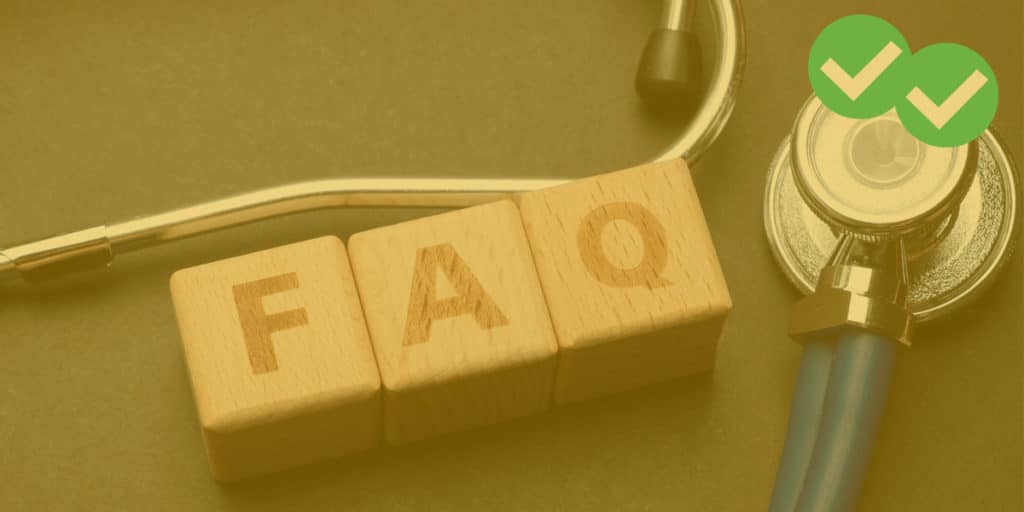
If you have lots of questions about the MCAT, take comfort in two things: first, the fact that you’re not alone! And second, that Magoosh’s experts have pooled our knowledge to answer your questions in this MCAT FAQ. Have a question? Chances are you’ll find the answer below. Take a look!
MCAT Sign-Up FAQs
The MCAT is offered by the AAMC around 20 times a year. All of the exams are administered at 8am. Check out our post on MCAT test dates for the current dates or the AAMC MCAT testing calendar.
If you’re wondering when to take the MCAT, the answer depends on several factors. You should take the MCAT when you will be most prepared. In an ideal world, most people would probably want to dedicate at least a month or two of studying, possibly even more, depending on how much time a day you can dedicate. To capitalize on the fees for the MCAT, it also makes sense to plan it out in advance and register early for a later date. Studying doesn’t always go as planned and having a later test date also allows you to have some time to make adjustments and change the date if necessary. Taking a practice exam as your test date approaches also can help you decide when you will be ready to take the MCAT.
To register for the MCAT, create an AAMC account. Make sure you have your official ID and payment method at hand during sign up!
You’ll take the MCAT at an official Pearson Vue test center. There are hundreds of these around the world; find out which centers are closest to you here. Availability can vary a lot by date and location, so plan in advance. For example, those taking the MCAT in India may need to travel to a different country, which will require some planning ahead.
The MCAT has several applicable fees: a registration fee of $305 if you register in the Gold or Silver zone, and a $355 feee in the Bronze zone. Each zone also has its own reschedule fee and cancellation refund.
This is pricy, but the AAMC Fee Assistance Program can provide financial aid resources to reduce (but not eliminate) these fees if you qualify—it’s definitely worth looking into!
You can take the MCAT if you’re applying for a program in the health sciences; “health professions” covers a wide range of fields beyond just a school of medicine (MD program). International students may need to get special permission from the AAMC to be eligible for the exam. Find out more in our post about MCAT eligibility!
Yes! You should take the following prerequisites before taking the exam:
-First-semester biochemistry
-Introductory biology
-General chemistry
-Organic chemistry
-Introductory physics
-Introductory psychology
-Introductory sociology
You can take the MCAT seven times overall in your entire life, but no more than three times in one year or four times in two years. Find out more in our post about how many times you should taking the MCAT!
Wondering if online prep is right for you? Test it out with Magoosh’s free MCAT trial (with practice test), which will give you access to 60 MCAT videos and 16 practice questions with video and written explanations!
MCAT Prep FAQs
There is no magic number that works for everyone. You need to determine for yourself how many hours you need to study. To figure this out, ask yourself the following questions:
How well do I recall the concepts tested on the exam?
This is an important one. As you’ve already seen in this MCAT FAQ, the MCAT covers a lot of subjects (general chemistry, organic chemistry, physics, biology, biochemistry, psychology, and sociology). The less you recall, the more hours you will need to put into your studies. If you had a high average science GPA years ago, particularly in prereqs (see earlier in the MCAT FAQ) that will help you with getting a positive application status in a few months, or even scholarships. However, GPA averages can’t tell you how much knowledge you’ve retained; take a practice test and see how well you do on the three science sections given where you are now. If you have not taken all of these classes, you will definitely have extra work to do.
One option is to take an MCAT class, either in-person or online, live in a classroom setting or pre-recorded. An MCAT class can be a wonderful way to get the best MCAT score you can, or it can be a waste of time and money. An important first step in deciding whether or not to take an MCAT class is an assessment of where you are now, what your goals are, and what your timeline for starting medical school is.
If you’re just starting in college, or even in high school now, taking an MCAT class would be too early to be helpful and probably too advanced for the coursework you have taken.
MCAT classes generally tend to help those who have a definite timeline and probably a test date in mind. That way, you have the benefits of the class and teaching right before writing the exam. If you have been doing poorly in practice exams or have already tested poorly in the MCAT, a prep course might help you boost your score. Often, test preparation courses have a guarantee for increasing your score a certain amount or your money back.
MCAT Format FAQs
The MCAT is not a computer adaptive test, so the questions you receive on your test day have all been pre-determined. For the MCAT, you are allotted a fixed amount of time for each section. During this time, you can answer questions on any passage or set of freestanding questions. This means that you do not have to do the questions in order. If you encounter a tough passage, you can skip it and move onto another passage. When you have gone through all of the questions, you can then go back to tackle the tougher passages as well as review any questions that you want. At the end of each section, your answer choices are fixed and can no longer be changed.
There is no writing sample requirement on the current MCAT whatsoever. For anyone who may be unfamiliar with the writing sample, prior to the 2013 testing year, all test-takers were required to complete a fourth section of the MCAT, which was simply called—you guessed it—the Writing Sample.
While being a good writer is definitely a necessary skill for medical students to have, the writing sample on the MCAT seemed to create quite a bit of uncertainty among students. Many students didn’t know if schools were even interested in the scores they received on this section and, as such, didn’t take it seriously. Furthermore, some test-takers felt that the writing sample section was more vulnerable to scoring inconsistencies. The writing sample was replaced with an optional trial section that tested out questions and topics for the 2015 MCAT, which is the current version of the exam.
Yes! All four sections of the MCAT are in multiple-choice format. This is different from how most college science prerequisite courses test knowledge, so getting comfortable with the format before the official exam is crucial!
In terms of science, the MCAT tests biochemistry, biology, chemistry (general chemistry and organic chemistry), physics, psychology, and sociology in three sections:
1. Chemical and Physical Foundations of Biological Systems
2. Biological and Biochemical Foundations of Living Systems
3. Psychological, Sociological, and Biological Foundations of Behavior
There’s a fourth section, as well, Critical Analysis and Reasoning Skills (CARS—think of it like verbal reasoning/critical thinking).
For more on what each section contains, check out our MCAT topics PDF!
MCAT Test Day FAQs
You’ll get three breaks on the MCAT: two 10-minute breaks (after the first and third sections) and one 30-minute break (after the second section). These are all optional, but it’s a great idea to take them.
Yes—well, kind of. You won’t get actual scratch paper on the MCAT, but you will get a noteboard with nine wet-erase pages measuring 8 x 14 each, as well as a fine-tipped marker.
No. You’ll need to do your calculations either mentally or using your noteboard. However, keep in mind that the test-makers know you don’t get a calculator, so if you find yourself doing advanced calculus, something’s gone wrong (no calculus on the MCAT!). Find out more in our post about calculators on the MCAT.
The MCAT starts at 8am. But get there earlier than that, so you have time to complete the check-in process! 7:30am is the latest you should arrive at the test center.
MCAT Scores FAQ
30-35 days after your test date, on the score release date announced by the AAMC. Scores will become available in your AAMC account before 5pm EST; you should receive a notification when they’re ready.
Your MCAT score report will give you your total score and your sectional scores. These will be accompanied by your percentile ranking, showing how you’d did in comparison to your testing cohort (and how your score stacks up to to the average MCAT score). Finally, you’ll also see the “confidence band” that shows the range of the score accuracy.
Technically, no. In practice, yes. For example, right now, MCAT scores are valid from as far back as 1991, in that AAMC will still report them. However, medical schools only accept scores that go back 2-3 years, so if you took the test earlier than that but are applying for admission to medical programs in this application cycle, you’ll need to retake it.







